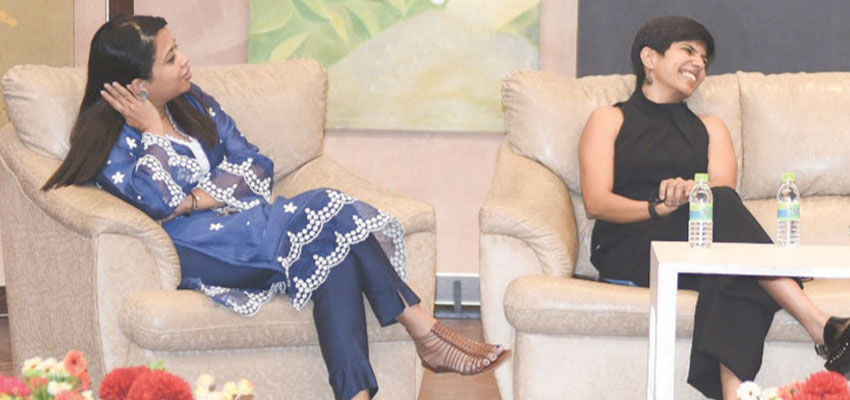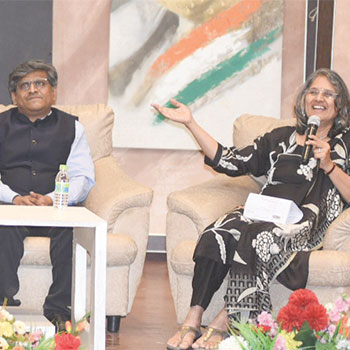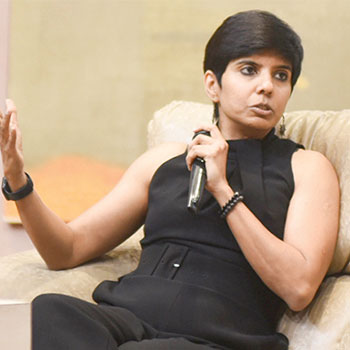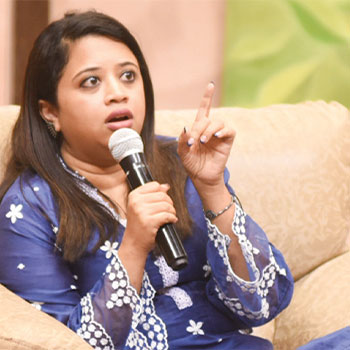REGIONAL MEDIA AND ITS CHALLENGES IN THE DIGITALISED WORLD

The regional media's history dates to the publication of The Samachar Darpan in Calcutta (Kolkata) in 1818. Regional media continues to flourish inspite of growing threats of globlisation, national or mainstream media, and digitalisation. Read on for an insightful discussion on “Regional media and its challenges in the digitalised world” by eminent regional media journalists, held recently at the 10th anniversary celebrations of Corporate Citizen magazine at Sri Balaji University, Pune (SBUP)
Panellists
- Samrat Phadnis, editor, Sakal Media Group
- Poonam Agarwal, founder, ExplainX, YT Channel and senior investigative journalist
- Dhanya Rajendran, cofounder and editor-in-chief, The News Minute
- Ujjwala Barve, dean, Tilak Maharashtra Vidyapeeth; professor and head of department (retd.), Department of Communication and Journalism, Savitribai Phule Pune University (Moderated the session)
Ujjwala Barve: Can we really differentiate media between national media and regional language media whether in digital or conventional form?

Samrat Phadnis: Yes. Definitely there is a difference and that is between the salaries and nothing else, because I have worked in both mediums. The salaries are much higher in English media outfits.
It is good that we use the word 'regional' as usually they use the word 'vernac' which is derogatory. But, I believe that the differentiation was done by the business vertical and not by the readers. Readers in Maharashtra usually read two newspapers. In a city like Pune, there is one English and other Marathi—usually the reader never differentiates between the mainstream, national or the regional media. Secondly, I believe that the regional media has more connect with the grassroot audience than the so-called mainstream media. Here is one small example. A senior most journalist in India visited a farmer's house as the farmer had committed suicide. He was unaware that a person could commit a suicide for a loan of one lakh rupees. So he donated it from his pocket. I am definitely aware that people can commit suicide for Rs10,000 debt. So, that is the difference in journalism of the national, prominently English newspaper, and the Hindi and other language newspapers.
Q: Would you (Poonam) agree with that? Because, you have worked in this field and you have worked with The Quint, and you have covered so many different stories. Is there a disconnect between the ground reality and people working in metros and covering stories in very small pockets or small villages? Do they need to work more on it or do they need to be sensitised more?

Poonam Agarwal: I agree with what Samrat says. It’s just not about the salary but it’s about many other things. When it comes to national television—when people watch national TV or read a national newspaper, they look for what are the main things that happened in India per se. So, if I want to read something in micro details about a particular event or any investigative report from a particular state, I would prefer a regional platform for it.
Secondly as a journalist, I have worked all my life in Delhi, so when it comes to reporting a story from a particular place, then I contact the local journalist. As he rightly said that a local journalist would know much more about any topic of farmer suicide or any other sort of scam or crime or anything else, rather than a person sitting in Delhi. So, that is the difference—you cannot really compare the knowledge of a local journalist with somebody who is sitting in Delhi. I still get surprised and amazed with certain details that I get from local journalists. For example, I received shocking details about sand mining when I was in Bhopal last month.
"You cannot really compare the knowledge of a local journalist with somebody who is sitting in Delhi. I still get surprised and amazed with certain details that I get from local journalists"
-Poonam Agarwal
Q: Dhanya you are with NewsMinute and especially working in South India. Tell us about and how it came about and how is the audience engagement? Because, we are talking about digital media and this is digital only platform.

Dhanya Rajendran: Both me and Poonam used to work for a TV channel which used to say ‘The nation wants to know’. And, then I decided that the nation doesn’t want to know this much. So I quit. But, in India you cannot quit a job and just sit at home because everybody else is worried for you. They ask like what is your next job? Then I started thinking like, can I take sabbatical or not? Then, I was forced to do a job, and I did not want to go back to television.
I thought I cannot go back to a TV channel that is why I started The News Minute. We are a feminist news organisation which looks at the five southern states. We report on politics, women, children and other issues.
Our job is to speak for the oppressed, for whoever doesn’t have a voice, and that is not being neutral. When I was a student, I was told that if you’re doing a story—let’s say a house is being burnt by somebody—you go and ask whose house is being burnt that how do you feel? You go and ask the person who burnt the house that how do you feel? You ask the policeman how do you feel? You just tell everybody’s feelings and the audience is supposed to figure out, maybe the house should have been burned. My job is to tell you if the person whose house is burned, is an oppressed person. If the person who burned the house, is a person with privilege and power. My job is not to tell you that A, B and C are characters in a story. My job is to tell you that A has more power than B, if B is oppressed than A, and then I make you decide whose side you want to take.
There was a comparison in the morning of a binary between Godi media and George Soros media. There are bunkers on two sides. There is Godi media in one bunker and there is George Soros media in the other bunker. That’s not a correct binary because, the media whichever it is, is supposed to stand with the people. For example, I report from the southern states. Who run the governments there? The DMK is in power in Tamil Nadu. The CPI-M is in power in Kerala. The TDP, Janasena and BJP are in power in Andhra Pradesh. Congress is in power in Karnataka and Telangana. We have written so much about DMK functions, where they take Dalits to temples. Even today in 2024, the Dalits are being taken to the temples for the first time in Tamil Nadu, a state which has always believed in social justice. Why is that happening now? So, we have to question the DMK government there? We have to question the CPI-M government in certain things? That is my job as a journalist. My job as a journalist is not to be in a bunker and say I am a Godi media, I am a George Soros media.
All of us can go wrong, but my point is that we have to choose to be voice of the voiceless.
Q: There is a study, that even though newspapers or media houses appoint female journalists, the news beats that are given to them are softer and non-significant.
Dhanya Rajendran: When I was a television journalist, all the hard beats—those requiring significant effort to build reliable sources— were typically managed by men. Poonam was among the first women reporters to handle those beats.
"Our job is to speak for the oppressed, for whoever doesn’t have a voice, and that is not being neutral. All of us can go wrong, but my point is that we have to choose to be voice of the voiceless"
-Dhanya Rajendran
Q: We’d like to hear from you (Poonam) on this gender debate.
Poonam Agarwal: The gender debate is never ending. It’s not only in India, but I think, it’s a global thing. As far as women are concerned, they are always looked upon with less intelligence—which is a very wrong way to put. The brighter side is, when it comes to task, a woman journalist or a woman employee is considered to be far more reliable than a male employee. This is exactly what one of my senior BBC colleagues said when he started investigative unit in India, that he wants women journalists, producers, and executives, in his team. When I asked him, why he is so biased towards women, he said, “If I engage one woman in a team of five, I know that out of those five, that one woman can do far better job than the remaining four. Because, a woman is far more responsible. They take their task very seriously, are sincere. For men, it’s just another job."
I didn’t enter this profession with the intention of becoming an investigative journalist. I came as a rookie reporter who had to cover everything under the sun. But, once I proved myself through one investigative story, ever since I was tagged with it. I have been asked to do certain stories which involved a lot of risks. My editors would ask if I would want to do it. They never thought about me as a woman. So, it is difficult but gradually we women are making our mark. Of course, there is a problem when it comes to the space in the media, but I feel women can really make their mark in the future, given the kind of sensitivity women have. Women are far more sensitive, let’s accept that-more sensitive towards issues. They take it more seriously when it comes to certain social issues.